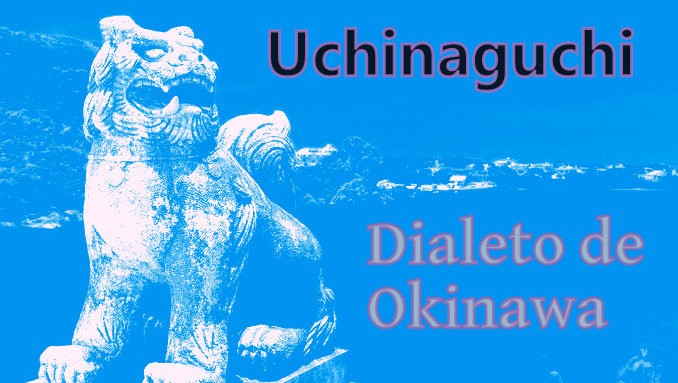Have you heard of Uchinaguchi [沖縄口 / ウチナーグチ]? This is the name of the dialect of the Okinawa archipelago [沖縄県], a set of tropical climate islands located at the southern tip of Japan. It can also be called Okinawa-Go 沖縄語 - Okinawa Language.
Among all Japanese dialects , Okinawan is probably the least known and studied among Japanese and foreigners alike, making it almost an entirely different language from standard Japanese.
To make things even more difficult, Okinawa encompasses several local dialects, some of which are even threatened with extinction. In this article we will know some words of this dialect and some curiosities related to the Okinawan language.
Read also:
- Ichariba Choode - The union in Okinawa sayings
- Okinawa - The multi-culture archipelago
- Goya Chanpuru – A bitter dish from Okinawa
Table of Content
Curiosities about the Okinawa Dialect - Uchinaguchi

There is not enough information on the Internet about Okinawan dialect. Compared to the Kansai and Hakata dialects, the amount of articles, videos, historical records, documentaries, detailed explanations, dictionaries and works done on the subject are quite scarce. Even in manga and anime it is much more common to find expressions from the Osaka dialect (Kansai-ben) or from other dialects, while Uchinaguchi almost does not appear. Probably, one of the reasons would be the fact that, if there were manga written entirely in uchinaguchi, this would hinder the reading of the manga by the Japanese themselves, who do not understand the dialect.
However, there are some books and articles on the Ryukyuan and Okinawan languages that can be of great use to the more curious student of Japanese, although most are written in English.
If you are interested in knowing a considerable amount of Okinawan words, along with standard nihongo equivalent synonyms, you can go to https://hougen.ajima.jp/ (it's all in Japanese). It has a lot of cool content in it.
Curiosities:
- If you want to say “Hello” in Okinawa, you have to pay attention to a small but important detail. Men say はいさい (Haisai) and women はいたい (Haitai) when they want to say “Hello”. Haisai (masculine) and Haitai (feminine) are two different ways of saying “Hello”, being considered a fundamental greeting that can be used at any time of the day.
- The inhabitants of Okinawa refer to the rest of the Japanese island as "Naichi" - ナイチ, which means something like "main island" or "mainland". This term is also used by the natives of Hokkaido (island to the north of the country).
- "I" in Uchinaguchi is said ワン (wan). Another way to say "I" that adds to the immense list of possibilities!
- "Sanshin" (三線、さんしん) is the name of a traditional musical instrument from Okinawa. It literally means "three strings," formed by the kanji for the number 3 (三) and the kanji for "line" or "string" (線). It is also known as the precursor of the Shamisen (三味線, しゃみせん).
- The pronunciation of many of the Okinawan words sounds similar to the pronunciation of Korean and Chinese words.
- When a main island (Japan) television program is broadcasting some Okinawan speaking, the program directors often put subtitles “translated” into standard Japanese (known as Hyojungo).

Okinawan Dialect Words and Phrases
- ちゅー・うがなびら - Hello or Good Afternoon.
- にふぇーでーびる - Nifee Deebiru - Thank you (there are also other ways to say Thank you in Okinawa, more complicated).
- うちなんちゅ - Uchinanchu - People of Okinawa ("uchinanchu" is the way to refer to the natives of Okinawa).
- "Nji Chaabira" - Until next time (equivalent to "Jya ne" - じゃあね in standard Japanese).
- Bem-vindo (equivalente ao "Youkoso" - ようこそ do japanese padrão).
- うちな - Uchina - "Uchina" means Okinawa. It is the word that refers to the island itself.
- "なんくるないさ" - "Nankurunaisa" - It has a meaning close to "Daijoubu" (大丈夫) which means "It's okay" or "Don't worry". However, it carries a deeper nuance as it conveys optimism and joy, something very characteristic of the people from Okinawa. It originated from a more complex phrase and is not as commonly used as "Daijoubu" in everyday conversations. In summary, we should keep in mind that it is an optimistic expression that brings a good feeling of willpower and confidence in a bright future ahead.
- カリー - Cheers - It is the term used when making a toast. Equivalent to 乾杯 (かんぱい, Kanpai).
- 長ーさやー (なげえさやあ) - Nagee Sayaa - It's been a long time! Similar to お久しぶり (おひさしぶり, ohisashiburi).
- How are you? How are you? (healthwise). Very similar to お元気ですか (おげんきですか, O genki desu ka) ou 元気にしてるの (げんきにしてるの, genki ni shiteru no).
- ワッサイビーン - Wassai Biin - Sorry. Forgiveness. Forgive me. Excuse me. Equivalent to ごめんなさい (gomen nasai) or standard すみません (sumimasen).
- Maa San - Tasty. Flavorful. Equivalent to うまい (umai) or 美味しい (おいしい, oishii).
- Amankai - Over there. Equivalent to あっちへ or あちらへ.
- Kumankai - Over here. Equivalent to こっちへ (kocchi he) or こちらへ (kochira he).
There are other important Uchinaguchi words and expressions to study, so I intend to keep updating the information in this Post over time, inserting new ones as I learn.
Live explaining the Okinawan dialect in depth
On the YouTube channel of “123 Japanese”, an online Japanese language school, you can watch a complete live of more than an hour of content telling the details and specificities of Uchinaguchi. In the video, Professor Takashi Yamanishi interviews Sansei Akira Uema, grandson of Okinawans.
Watch below, subscribe to 123 Japanese channel and leave your like there too:
Other Dialects of Japan
- Osaka dialect
- Hakata dialect
- Kagoshima dialect
- Tohoku dialect
- Tsugaru dialect
- Nagasaki dialect
- Hiroshima dialect
Want to know about another dialect? Feel free to suggest!
JLect - Online Dictionary of Dialects
Jlect is a website that works like an online dictionary. In it you can type words from different dialects, in addition to being able to select which region of the word you want to search. You can search in English, Romaji, or Japanese (hiragana, katakana, and kanji). It is an extremely intuitive and easy to use tool. In order not to be hostage to Jisho and refine the search for expressions from different dialects, JLect is the ideal option.
Click here to access the JLect.
Did you like the article? So don't forget to share it with your friends and on your social networks!
